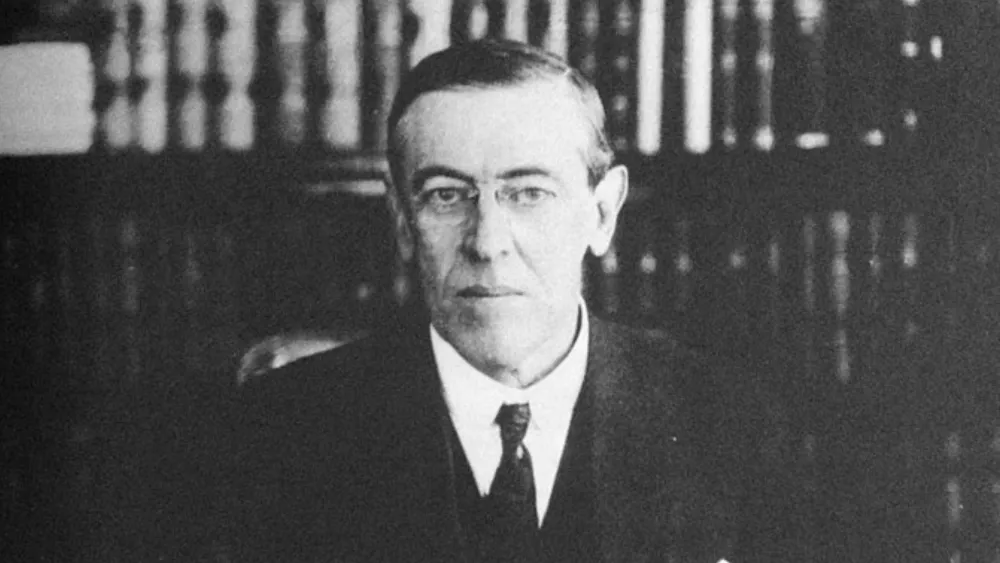The legacy of Woodrow Wilson is a study in contrasts. He receives praise for his contributions to American democracy on the one hand and condemnation on the other for his shortcomings in areas like racial relations and civil liberties.
During his administration, Wilson oversaw several ambitious internal changes designed to build a more just and equal society. He also took a revolutionary stance regarding foreign relations, particularly in the aftermath of World War I. Born amid the American Civil War and raised in the South during a time of profound social transformation, Wilson’s worldview was deeply shaped by the cultural and political shifts of his youth.
The long shadows cast by the Civil War, the Reconstruction era, and the persistent realities of racial injustice would inform Wilson’s political decisions, both positive and problematic. As a product of his time, Wilson’s efforts to reconcile progress with prejudice remain a source of continued debate.
From Scholar to Statesman
Wilson was deeply committed to understanding and reshaping the American political system, beginning with his academic pursuits. Long before entering politics, he had established himself as a respected scholar, writing extensively on the structure and functioning of government. His academic work laid the foundation for the liberal principles he would champion later in public office.
Born in Staunton, Virginia, on December 28, 1856, Wilson spent his formative years in Augusta, Georgia, during the Civil War and Reconstruction. His father, a Presbyterian minister, and his mother, who came from a wealthy, slaveholding family, provided him with a diverse cultural background. These early influences contributed to his nuanced, if at times contradictory, perspectives on governance and social order.
After beginning his studies at Davidson College, Wilson transferred to Princeton University, graduating in 1879. He went on to earn a law degree from the University of Virginia and later completed a Ph.D. in political science at Johns Hopkins University—becoming one of the few U.S. presidents to hold such an advanced academic credential.
Financial Reform and Economic Stabilization
Wilson was born in Staunton, Virginia, on December 28, 1856. Spent the Civil War and Reconstruction years growing up in the American South, mostly in Augusta, Georgia. Wilson taught at several institutions before becoming president of Princeton University and a proponent of progressivism in higher education.
Wilson’s mother hailed from a rich, slave-owning family, while his father was a Presbyterian clergyman. His multicultural upbringing significantly shaped his political worldview. Wilson enrolled at Davidson College before moving on to Princeton University, where he earned his degree in 1879.
He pursued a Ph.D. in political science at Johns Hopkins University after getting a law degree from the University of Virginia Law School, demonstrating his dedication to education and public service.
Wilson defied party leaders when serving as governor of New Jersey from 1911 to 1913. As a result, some progressive changes were passed. At the 1912 Democratic National Convention, he rallied progressives and Southerners to support his bid for the presidency.
During Wilson’s administration, important legislation, such as the Federal Reserve Act, Clayton Antitrust Act, and Federal Trade Commission Act, were passed. These policies sought to limit the influence of big business, encourage fair competition, and strengthen the American economy. Wilson’s domestic reforms included suffrage for women, and the 19th Amendment gave women the right to vote.
Detailing Wilson’s Intellectual Journey
Wilson’s academic legacy is often overshadowed by his political career, but his contributions to political thought remain significant. His early work, including Congressional Government (1885), critiqued the inefficiencies of the American system and advocated for more streamlined executive leadership. These ideas influenced his own approach to presidential governance, emphasizing a proactive and centralized administration.
Wilson began his teaching career at Bryn Mawr College, then moved to Wesleyan University, and finally to Princeton University. As president of Princeton from 1902 to 1910, Wilson implemented substantial reforms. He restructured the curriculum to emphasize critical thinking and interdisciplinary studies, sought to reduce elitism within student organizations, and attempted to modernize the university’s administrative structure. His efforts laid the groundwork for a more inclusive and intellectually rigorous educational environment, though not all his reforms were universally accepted.
Woodrow Wilson and His Decision to Delay Marriage
In September 1883, Woodrow Wilson made a marriage proposal; Edith accepted it; nevertheless, they decided to put it off while Wilson pursued his doctorate studies. Axson earned her degree from the Art Students League of New York, specialized in portraiture, and won a medal at the Exposition Universelle (1878) in Paris for one of her pieces. In order to wed Wilson in 1885, she consented to forgo future solo creative endeavors.
In order to assist Woodrow with finding German-language political science articles pertinent to his work, Edith decided to study the language. Margaret, the couple’s first child, was born in April 1886. Jessie, their second child, was born in August 1887.
In October 1889, Eleanor, their third and last child, was born. Francis Bowes Sayre Sr., who eventually worked as the Philippines’ High Commissioner, wed Jessie in 1913. Eleanor, their third child, wed William Gibbs McAdoo in 1914. McAdoo had served as Woodrow Wilson’s secretary of the Treasury and subsequently became a U.S. Californian senator.
Margaret, the couple’s first child, was born in April 1886. Jessie, their second child, was born in August 1887. In October 1889, Eleanor, their third and last child, was born. McAdoo had served as Woodrow Wilson’s secretary of the Treasury and subsequently became a U.S. Californian senator.
Wilson’s Vision for Education Reform
Wilson gained fame for his suggestions for improving education while serving as president of Princeton University from 1902 to 1910. He desired to alter the admissions process, the teaching system, the social system, and even the campus’s physical design to provide his idealized intellectual life for democratically selected students.
Wilson, though, was an action-oriented thinker. He then joined politics and made a name for himself as a reformer while serving as governor of the State of New Jersey from 1911 to 1913.
In 1912, Wilson was declared the winner of the presidential election. As soon as he was elected, he started enacting the changes he had proposed in his book The New Freedom, such as lowering the tariff, reforming the banking system, monitoring monopolies and deceptive advertising, and outlawing unfair business practices.

Woodrow Wilson in Celebrating Domestic Reforms
The legacy of Woodrow Wilson is a complicated one. He receives praise for his domestic reforms and support of the League of Nations. But he has also faced criticism for his handling of racial issues and civil rights. Notably, this criticism stems from his encouragement of segregation within the federal government.
However, Wilson’s influence on American politics and the rest of the globe cannot be disputed. He was an inspiring leader who worked to create a just and equitable society at home and abroad. His commitment to education, liberal principles, and international collaboration impacted American politics and helped pave the way for many institutions and changes still in place today.
Woodrow Wilson showed ambition, vision, and dedication to advancing society throughout his life and work. Wilson produced an enduring legacy that continues to impact the United States and the rest of the globe, from his early academic years through his transformational administration.
His commitment to progressive change, global collaboration, and education is evidence of visionary leadership’s impact on changing history.
World War I and the League of Nations
Wilson’s legacy also hinges on his foreign policy decisions, particularly during and after World War I. Initially committed to neutrality, Wilson led the U.S. into the conflict in 1917, citing the need to make the world “safe for democracy.” His Fourteen Points speech outlined a vision for a peaceful postwar world, emphasizing self-determination, free trade, and the formation of a League of Nations to prevent future conflicts.
Although the League of Nations was ultimately established, the U.S. Senate refused to ratify the Treaty of Versailles, largely due to fears of entangling alliances. Wilson’s refusal to compromise and his subsequent health issues, including a debilitating stroke, hindered his ability to rally support for the League domestically.
Despite its failures, the League laid the groundwork for future international cooperation and was a precursor to the United Nations.
The Complicated Legacy of Woodrow Wilson
The legacy of Woodrow Wilson is undeniably complex. On one hand, he is celebrated for his visionary leadership, educational reforms, and foundational role in shaping modern American liberalism. His advocacy for international diplomacy and institutions of peace signaled a new era in global relations.
On the other hand, his administration’s regressive stance on civil rights and federal segregation policies highlights the contradictions that defined his life. Critics argue that Wilson’s racial views and decisions must be confronted and acknowledged as part of the broader narrative.
Even in death, Wilson remains a divisive figure. In recent years, institutions like Princeton University have grappled with how to honor his achievements while recognizing his failings. In 2020, Princeton removed Wilson’s name from its School of Public and International Affairs, citing his racist policies as incompatible with the school’s values.
Conclusion: A Leader of Vision and Paradox
Woodrow Wilson demonstrated ambition, vision, and an unwavering dedication to advancing society. From his academic scholarship to his sweeping presidential reforms, Wilson helped shape the trajectory of American governance, education, and international relations.
His legacy serves as a reminder that historical figures are rarely one-dimensional. They are shaped by their time, and their contributions must be weighed against their contradictions. Wilson’s story is taught in history classes as a quintessential example of American valor and virtue—but also as a cautionary tale about the limits of progressivism when it excludes justice for all.
In acknowledging both his achievements and his failures, we gain a more complete understanding of the man—and of the nation he helped mold.








